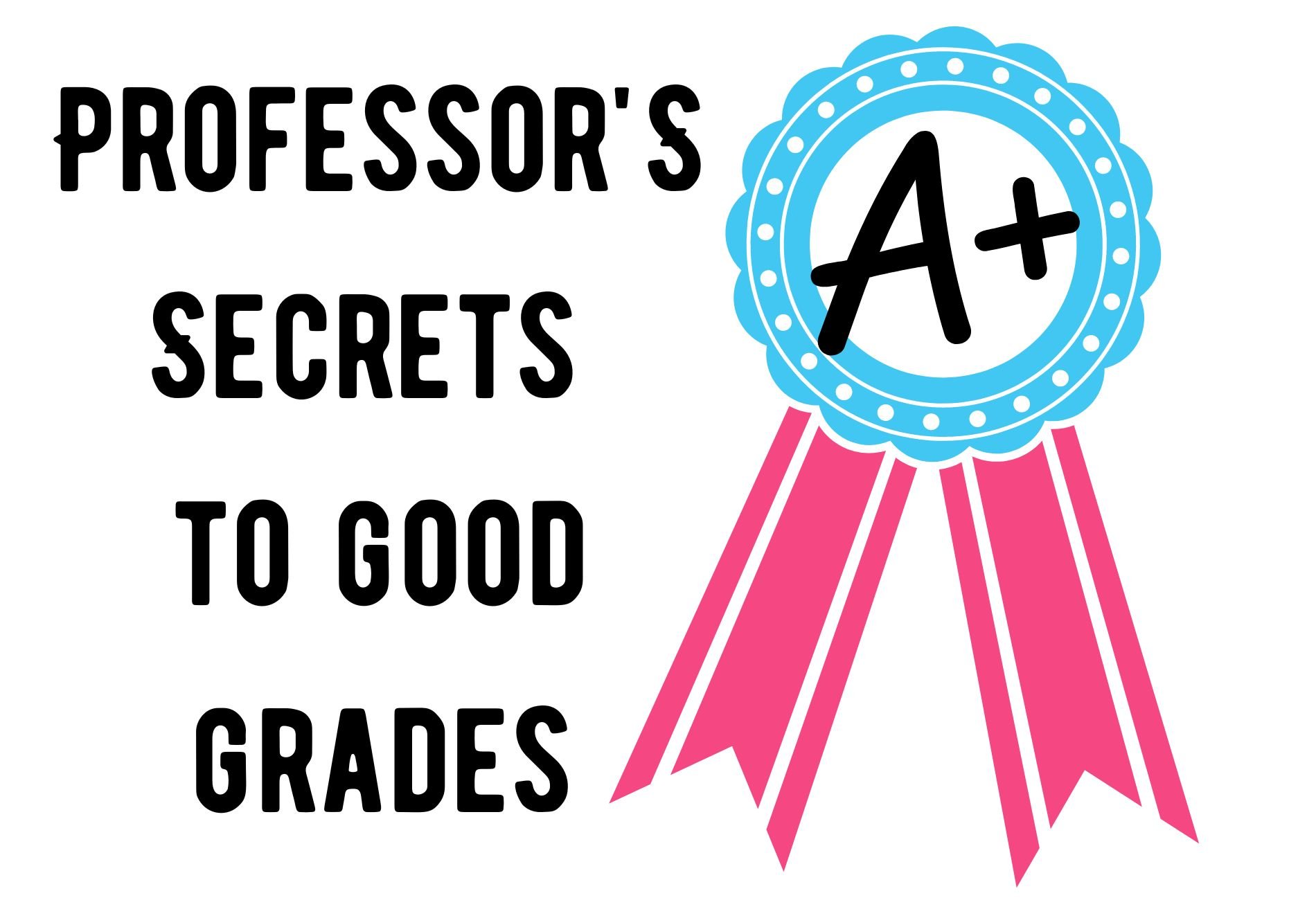A professor’s secrets to getting good grades
About the author
Hi there. I am the prolific professor with 15 years of experience teaching online and in-person. I have a graduate degree. I have a passion for education. But I’ve also worked in the professional world (outside of education) too. Thanks for visiting.
How to get get good grades in college
You’ve landed here because you are wondering how to can get better grades.
Maybe you are working hard, and just not earning good grades, or you are getting ready to start the semester and want to figure out this whole college thing.
Lastly, you could be that student who just wants to find out the secrets to getting good grades with the least amount of effort required.
Well, I know a lot of information that can help you succeed. I was a professor for 15 years. And I graded thousands of students’ assignments, gave hundreds of exams, and created dozens of grading rubrics. So, I know a thing or two.
After reading this article, you are going to know exactly what professors are looking for so that you can make good grades. And I will give you some tips on how to earn good grades too.
I do need to say that not every student will succeed, even with all these secrets because not everyone has the same academic rigor, skills, knowledge or time to make good grades. While I think the vast majority of people can do it with these tips, not everyone can.
But I bet you can. Let’s get started.
Read the grading rubric and follow it
Most professors should have a grading rubric for how they objectively grade assignments. Not every professor will have a rubric because it isn’t some kind of college policy, but it is just a good practice.
A rubric should categorize all the content that the professor expects from students. And you should know exactly what would get a perfect score on an assignment vs a bad grade. It’s literally a road map to your success.
Keep in mind that grading rubrics can be rather vague and subjective, so your grade might not always align with the rubric. Anytime a human is grading an assignment, there will be some subjectivity.
What I mean is that one professor could grade your assignment and give you a 90 while another professor thinks it’s a 70. That’s because there is some subjectiveness to grading, most of the time.
So, grab the rubric, and make sure you hit all the marks for a perfect score.
Talk to your professor
I know it may seem intimidating and time consuming to talk to your professor, but reach out to them anyway.
If you have a major assignment due, go to their office weeks before it is due, and ask about their expectations. I wouldn’t suggest you bring a rough draft or anything in for them to review, because they aren’t going to want to edit a draft just for you and not everyone else. But instead, give them your ideas for the project, and ask what they think about your vision. You could even bring in an outline.
Hopefully they will give you the green light to move forward. It doesn’t guarantee a good grade, but it can help.
So, reach out, and meet with them. Let them know you are very concerned about getting a good grade on the project and want to make sure you are meeting their expectations. Every little bit helps.
Your professor can make sure you understand the project and can direct you further. Don’t underestimate these opportunities.
And if you have made a bad grade, and are wondering how you could improve, you should schedule a meeting with your professor to talk about your performance. Since they are the ones who are creating the exams, and grading assignments, they need to be the ones to tell you how you can get better.
But never ever wait until the end of the semester to start these discussions. They need to happen from the very beginning of the semester.
Get a tutor
Some universities have teaching or graduate assistants. There might be someone in the department that can give you FREE tutoring. Talk to your professor and ask if they have any suggestions for a tutor.
Sometimes it comes directly from the college, or a third-party contract. Maybe your college works with a company that provides tutors for college students. Or maybe they have tutors that they’ve hired and students can attend on campus.
I have seen colleges hire adjunct professors for tutoring positions so it’s quite possible they offer something like this. Go to your college’s website and search tutoring or tutor and see what you can find. It’s often free.
If you had the funds, you could always hire a private tutor. And remember, your professor should be willing to help you understand the material so go during office hours to discuss anything you need help with. While they can’t repeat entire lectures or sit with you while you do your homework, they should be able to answer your questions to clarify the material.
Improve your studying habits
You might not get good grades because you just don’t know how to study. Think about how you could improve your studying habits and strategies.
Some colleges have seminars where you could learn more information on these subjects. Check and see if there is a counseling or student life department at your university. I have seen many colleges who regularly hold seminars/trainings for students in different areas.
They may include something about studying tips and tricks. If not, start researching the best ways to study and see if you can get to work on improving your strategies.
Lastly, reach out to your professor and ask if they have any tips based on their experience. Sometimes they can share with you what other students have done in the past to make good grades.
Find out what kind of learner you are
There are different types of learners. Some people learn better visually while others might need to immerse themselves in activities for a more hands-on experience.
Either way, people learn differently and you need to think about how you learn.
Do you prefer to be more visual? Do you need the PowerPoints to stay focused or would you prefer to read the information in a book. Maybe you really like exercises or are more inclined to hear the information presented.
As you can see, there are different ways people learn and take information in. If your professor primarily does PowerPoints, but you need activities to learn better, you’ll need to understand how to adapt.
Create a study group
Sometimes students learn better from other students. Talk with other classmates and find out if they want to create a study group. Maybe you meet once a week or every other week to review the material.
Having other students who can share their ideas and explain material is really powerful for students.
So, please consider creating a study group with other classmates to go over the material.
If it doesn’t help you get better grades, at least you made a few friends.
Study more
Your grades can be a reflection of how much time and effort you put into studying, so make sure you are really spending enough time doing these things.
While you need to study the right way, you also need to study enough.
If you aren’t making good grades, you should really think about how much time you are spending on the course. If you aren’t spending the recommended time reviewing the material, you need to increase this right away.
This is often where I would see most students miss the mark. The problem was usually their studying habits and by spending more time focusing on the material, students usually did better.
Find your passion
Oftentimes people will be more inclined to study and immerse themselves in a subject when they are really passionate about a topic.
If you aren’t really enjoying your major, maybe it isn’t for you. Obviously bad grades don’t always mean that you aren’t passionate about the subject, but it’s something to consider.
Look, I get it. Not every course you take at a college will be directly focused on your major, or even your career. And sometimes you just have to get through it.
But the more classes you take, that you love, the better experiences you will probably have. It’s just hypothetical, and may not be true for everyone, but it’s worth talking to an advisor about and pondering.
Find the perfect professor
I am not suggesting that you just look for professors that are considered easy professors, but search for professors that are most compatible with you and your learning style.
I have the perfect guide to finding a terrific professor here.
But keep in mind that you are really trying to find a good match for you, and not just looking for the easiest classes.
When you find that professor who just clicks with your learning style, and makes you excited to come to class, I think you’ll see your grades improve.
Students’ grades don’t always fall back on the professor and their teaching abilities, but there could be some correlation.
Stay organized
During your college career, you are going to need some organization to stay focused. Make sure you plan accordingly to study, do assignments, and go to class.
You might need to get a planner to organize everything, but don’t underestimate the power of organization. If you are planning everything out and actually making time for college, you will likely do better.
Don’t overlook organization. Think about it. Bad grades might happen because you rushed to complete an assignment because you forgot about it or procrastinated. But if you would have just prepared for it in advance, you might have done better.
Look, college can be challenging, and it should be, but it doesn’t have to be disappointing. Take these things and implement them to make good grades.
You’ve got this.
This website contains affiliate links and we may earn a commission on any purchases you make from clicking on our links.




